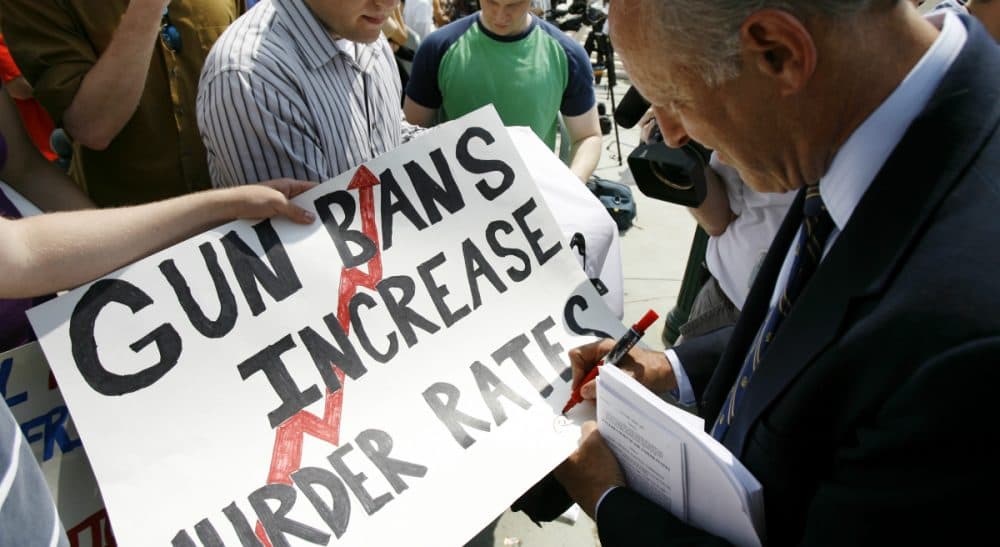Advertisement
America's Epidemic Of Gun Violence: The Supreme Court Must Share The Blame

The drafters of the Bill of Rights would be dumb-founded by the current state of gun law. They provided us with one short phrase:
A well regulated Militia, being necessary to the security of a free State,
the right of the people to keep and bear Arms, shall not be infringed.
Among lawyers and judges, the first line has caused all the debate. If the second amendment simply declared “[T]he right of the people to keep and bear Arms shall not be infringed,” the constitutional scope of gun rights would be clear. To achieve our current legally simplistic version of gun rights all we need do is ignore the first half of the Second Amendment — problem solved.
The drafters of the Bill of Rights would be dumb-founded by the current state of gun law.
In fact, in Heller v. District of Columbia, the Supreme Court did just that as it invalidated a general ban on handguns, ruling that the Second Amendment confers an individual right to have an unlocked and loaded handgun in the home, separate and apart from service in any militia, well-regulated or not. But before we give Justice Antonin Scalia and the Heller majority a well-deserved grade of F in legal analysis, we are obliged to show that we can do better.
After 230 years, the amendment’s phrasing is archaic, odd to the modern ear. But to any classically educated person in the eighteenth century, it was a familiar mode of expression derived from Latin and used to define a condition. For example: "Your job interview having been scheduled on this rainy day, you may use my car." That may be awkward phrasing, but you know you don't have my permission to drive to the dog track tomorrow after it clears. The right to bear arms is conferred so that we have the ability to protect our collective security. Lawyers and judges, including Justice Scalia, a self-professed “originalist,” are professionally bound not to take words out of context.
In addition to the introductory clause, there is another contextual reason to reconsider modern gun jurisprudence. Select the item that doesn’t belong on the following list:
1) free speech,
2) freedom of assembly,
3) freedom of religion,
4) the right to petition the government, and
5) the right to carry a gun.
The first four are undeniably derived from political philosophy, substantive in nature, and describe basic notions governing how we should live together. A gun, by contrast, is a tool. In today’s culture wars, some may have transformed it into an enhancement of self-image or self-expression, but it’s basically a tool without any intrinsic attribute, just like a wrench or a hacksaw, even if much more dangerous. Read in context, arms are tools “necessary to the security” of our substantive liberties.
Recognizing the obvious purpose for the right to bear arms makes it a lot easier to determine the extent to which limits can be imposed without violating the Constitution. We can still debate the permissible limits of individual possession – at least among those who belong to a militia – but we should dismiss out of hand the notion that carrying open or concealed firearms in bars, churches, college lecture halls or movie theaters is a constitutional right. There is no legally rational argument that background checks, training requirements, licensing or reasonable limits on the size of private arsenals violate anyone’s constitutional rights.
I, and every judge in the country, must follow [the Supreme Court's Heller decision], but that doesn't make it right.
It is well established that no constitutional rights are absolute. The Heller decision does give lip service to that principle, but it fails entirely to recognize the obvious import of the reference to a militia, and so has reduced drastically the scope of society’s ability to impose constitutionally acceptable limits. Two years after Heller, the Court missed an opportunity to repair its dismissive approach to the introductory clause. Instead, in McDonald v. Chicago, the same five-judge majority ruled that Chicago’s ban on individual hand gun ownership violated Heller, and that Heller, a federal case, applied to state laws as well.
In 1803 in Marbury v. Madison, Chief Justice John Marshall stated the obvious: “It cannot be presumed that any clause in the constitution is intended to be without effect.” We suffer an average of 30,000 gun deaths annually; more than 10,000 of these are homicides, and most of the remainder are suicides committed with effortlessly-obtained firearms. All the while, even modest efforts to reduce the carnage have been frustrated by a Supreme Court failing to follow Marshall’s simple rule. The recent school shooting in Oregon is one of 14 mass murders that have claimed 125 lives since 2009 and that were committed with legally purchased weapons.
I, and every judge in the country, must follow Heller, but that doesn't make it right.
